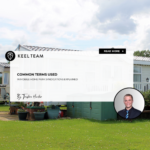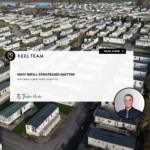What Happens If a Tornado Destroys Your Mobile Home Park?
-
 Tristan Hunter - Investor Relations
Tristan Hunter - Investor Relations

Natural disasters, like tornadoes, can leave devastating impacts on communities, including mobile home parks. From damaged homes to displaced residents, the aftermath is often chaotic. While no one can predict the full scope of a disaster, understanding the general process and options available after such events can help mobile home park owners and investors navigate recovery.
Immediate Response After a Tornado
The first step after a tornado is ensuring the safety of residents and assessing the damage. Many mobile home park owners work with federal, state, or local agencies for immediate assistance. Agencies like FEMA often step in to coordinate cleanup and provide temporary housing. This process might include:
- Debris removal and demolition: Severely damaged homes are cleared to create space for new units.
- Utility testing and repairs: Mobile home park owners may need to check water, sewer, and electrical systems to ensure functionality.
- Temporary housing installations: FEMA may provide temporary homes to accommodate displaced residents.
These actions help stabilize the community while setting the foundation for long-term recovery.
FEMA’s Role in Recovery of Your Mobile Home Park
In many cases, FEMA plays a significant role in supporting mobile home park recovery efforts. After a declared disaster, FEMA can provide assistance, such as:
- Financial support: FEMA may offer grants to help affected individuals, even those without prior insurance.
- Temporary housing: Mobile home parks can lease pad sites to FEMA for placing temporary units. This arrangement can bring income to park owners while supporting displaced residents.
- Cleanup assistance: FEMA can cover some costs related to removing damaged structures and preparing sites for new homes.
To maximize FEMA’s involvement, trailer park owners should proactively communicate the availability of vacant lots. Platforms like SAM.gov can help owners connect with FEMA for recovery opportunities.
Download our FREE eBook on the Top 20 things to know BEFORE investing in mobile home parks!
Steps for Mobile Home Park Owners
Recovering from a tornado involves multiple phases, from cleanup to rebuilding. Mobile home park owners can take these steps to streamline the process:
1. Assess the Damage
Start by evaluating the extent of destruction. This includes structural damage to homes, roads, and utilities. Bring in professionals to conduct thorough inspections, especially for underground systems.
2. Engage the Right Partners
Partnering with experienced contractors and engineers can simplify the rebuilding process. These experts can:
- Recommend site modifications.
- Ensure compliance with updated flood maps or zoning requirements.
- Handle utility installations and repairs.
Early engagement ensures better planning and avoids surprises during reconstruction.
3. Leverage Insurance
Loss-of-business income insurance, if available, can help cover financial gaps during recovery. While FEMA provides temporary solutions, insurance payouts might assist with long-term rebuilding efforts.
4. Prepare for Future Resilience
Consider making upgrades that minimize future risks. For instance:
- Elevate homes in flood-prone areas.
- Use durable materials for infrastructure repairs.
- Incorporate modern utilities like PVC sewer lines or 200-amp electrical pedestals.
These improvements can reduce vulnerabilities and attract future residents.
Financial Benefits and Risks
While a tornado can bring destruction, some recovery efforts might present financial opportunities for mobile home park owners. For example:
- FEMA pad rentals: Leasing spaces to FEMA for temporary housing generates income while helping the community.
- Upgraded infrastructure: Repairs often include modernizing utilities, which can increase property value.
- Market demand: Displaced residents may create a higher demand for housing, encouraging faster community recovery.
However, recovery is not without risks. Unexpected costs, such as utility replacements or compliance upgrades, can strain budgets. Conducting thorough due diligence during repairs is critical to avoid overspending.

A Mobile Home Park Destroyed by a Tornado
Temporary Housing: What to Expect
FEMA typically installs temporary housing units for up to 18 months. These units are owned by FEMA and removed once the agreement ends. During this period, mobile home park owners should:
- Coordinate logistics with FEMA contractors for installation and removal.
- Plan for the next phase, such as acquiring and placing permanent units.
- Communicate timelines to residents to ensure a smooth transition after FEMA’s departure.
This temporary arrangement bridges the gap while longer-term housing solutions are developed.
Building a Resilient Mobile Home Park
As part of the rebuilding process, mobile home park owners should focus on long-term improvements. Some key considerations include:
- Utility systems: Modern materials like PVC for water lines and updated electrical pedestals improve reliability.
- Zoning and compliance: Ensure the property meets local regulations and disaster-prevention guidelines.
- Community amenities: Investing in features like storm shelters or emergency plans can boost resident confidence and safety.
Working closely with contractors who understand mobile home park development can streamline these efforts and ensure high-quality results.
Lessons Learned from Past Disasters
Tornado recovery offers valuable lessons for mobile home park owners and investors. Key takeaways include:
- Preparation Matters: Proactive measures, such as regular utility maintenance and having an emergency response plan, can minimize disaster impact.
- Collaboration Is Key: Engaging experts early and working with agencies like FEMA ensures smoother recovery.
- Adaptability Is Essential: Be ready to adjust plans based on disaster-specific challenges, such as updated flood maps or unforeseen utility damages.
Conclusion
While tornadoes can cause significant damage to mobile home parks, recovery is possible with the right approach. Mobile home park owners can likely rebuild stronger communities by assessing damage, leveraging government assistance, and investing in long-term resilience. Although challenges are inevitable, proactive planning and effective partnerships can make the journey more manageable.
Are you looking for MORE information? Book a 1-on-1 consultation with Andrew Keel to discuss:
- A mobile home park deal review
- Due diligence questions
- How to raise capital from investors
- Mistakes to avoid, and more!
Disclaimer:
The information provided is for informational purposes only and is not investment advice or a guarantee of any kind. We do not guarantee profitability. Make investment decisions based on your own research and consult registered financial and legal professionals. We are not registered financial or legal professionals and do not provide personalized investment recommendations.

Tristan Hunter - Investor Relations
View The Previous or Next Post
Subscribe Below 👇





